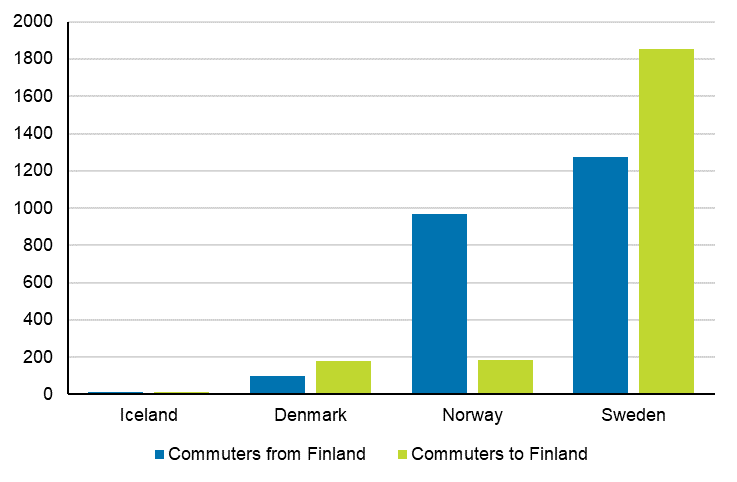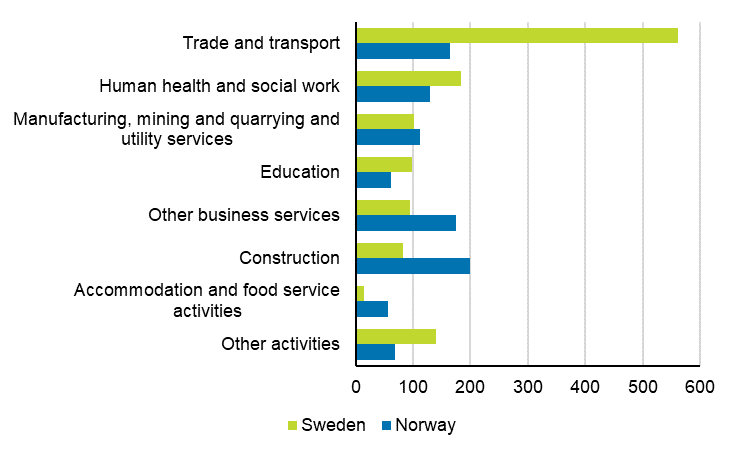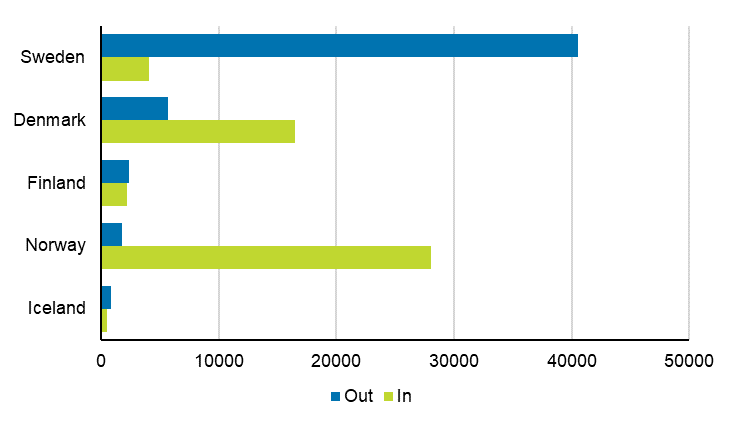News 3 Mar 2021
Finns commute most to Sweden
At the end of 2015, a total of 2,400 Finns worked in another Nordic country. Over one-half of Finns headed to Sweden to work and good 40 per cent to Norway. The number of persons working in another Nordic country, or commuters, was highest in Northern and Eastern Finland, one-third in all.
Finns commute particularly from the border municipalities to Sweden and Norway, that is, Utsjoki, Inari, Enontekiö, Muonio, Kolari, Pello, Ylitornio and Tornio. The share of those living in these municipalities was around one-fifth of all persons in Finland working in another Nordic country.
Sweden was the main destination especially for people from Åland and those living in the border municipalities to Sweden and Norway, but also for people living in Uusimaa and Southern Finland. Of all commuters, 65 per cent were men.
Commuting between Finland and other Nordic countries in 2015

Nearly one-third of Finnish commuters worked in the industries of trade and transport. Employees in human health and social work also commuted much from the border municipalities of Northern Finland.
Finns working in Sweden and Norway by industry in 2015

Around 2,200 persons from another Nordic country worked in Finland. Of them, 85 per cent came from Sweden.
Swedes work most outside their home country
At the end of 2015, the total number of persons working in another Nordic country was around 51,000. Those living in Sweden worked most outside their home country – they numbered nearly 40,600. The number of Danes working outside their country of residence was 5,700, that of Norwegians 1,800 and that of Icelandic residents 850. Two-thirds of all Nordic commuters were men.
Commuting between the Nordic countries is dominated by commuting flows from Sweden to Norway and Denmark, which covered 75 per cent of all commuting between the Nordic countries.
Commuting flows: outward and inward commuting between the Nordic countries in 2015

"Free movement between the Nordic countries has been an important part of the common identity and strength of Nordic societies. For example, working across the border in neighbouring countries has been normal practice in border areas for decades – in Finland, for instance, in Tornionlaakso and in Sweden and Denmark on both sides of Öresund,” says Kaija Ruotsalainen, Head of Development at Statistics Finland.
In the statistics, a person who has a place of work in a country other than their official permanent place of residence is classified as a commuter, i.e. as working in another country. To qualify as a commuter, a person does not have to travel daily or even weekly from their home country to work but may also have a longer term, temporary dwelling in their country of work.
Nordic Mobility report also contains information on qualifications and degrees attained abroad
The recently published Nordic Mobility report contains information about mobility across the borders of the Nordic countries. The aim of the Nordic Mobility project funded by the Nordic Council of Ministers was to produce statistical data on moving between the Nordic countries and on working and studying in another Nordic country.
In the project coordinated by Statistics Finland, extensive individual-level data exchange was conducted for the first time between the Nordic statistical institutes. "Official statistics widely describe studies, qualifications and degrees attained and the national labour market, but statistical data on cross-border studying or working are not produced within the scope of official statistics. Similarly, qualifications and degrees obtained abroad largely remain hidden from the registers of qualifications,” says Ruotsalainen, the project leader.
New, higher education data were obtained through the exchange of data between the statistical institutes for a total of around 100,000 persons in the Nordic countries. Finland received 14,000 new data on qualifications and degrees.
“In Finland the effect of updating qualification data may be regionally significant. For example, according to statistics, the level of education on Åland has been considerably lower than elsewhere in the country because young people on Åland often complete a qualification in Sweden or elsewhere abroad, and this information is not updated into the Register of Completed Education and Degrees. Through the Nordic exchange of information now conducted, the share of completers of qualifications rose by around four percentage points on Åland,” says Ruotsalainen.
Nordic Mobility report
Nordic Statistics database
Further information: Head of Development Kaija Ruotsalainen tel. +358 29 551 3599
